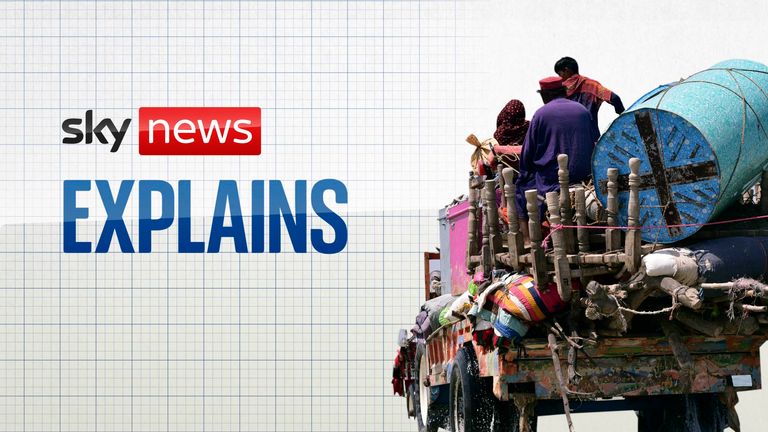Russian bombing has destroyed five million acres of forest in Ukraine in less than six months, President Volodymyr Zelenskyy has said in a blistering attack on Vladimir Putin’s war and its global ramifications.
War “destroys the ability of the world to work together for a common goal,” Ukraine’s president said in a video address to world leaders at the COP27 climate summit.
“There can be no effective climate policy without peace on Earth” if nations are too preoccupied “to think only about protecting themselves here and now from their threats”, he argued.
Pakistan issues an emotional appeal – Latest COPs
Russiathe war and the cut off of the gas supply have sent prices soaring, triggering countries including the UK, Germany, India and Pakistan to burn more coal – the dirtiest fossil fuel – to keep the lights on.
On Monday, the Russian delegation told Sky News that an energy crisis was brewing ahead of its “special operation” in Ukraine.
During the UN climate talks, many leaders have issued warnings about how war threatens global climate action, turning countries inward and diverting attention from the collaboration needed to tackle to the crisis.
Connecting the dots between interrelated threats, the war-triggered food crisis has “hit hardest on countries suffering from existing manifestations of climate change, catastrophic droughts and large-scale floods”, Zelenskyy added.
Egypt, which is hosting the climate talks in Sharm el-Sheikh on the Red Sea, exemplifies this connection. The world’s biggest importer of wheat, used to make its staple bread, was reeling when war disrupted grain exports.
Climate change is slowly eating away at its limited fertile land as the Nile dries up and salt from rising seas poisons the Nile Delta.
“Tax the fossil fuel companies that profit from war profits”
The second day of the annual two-week summit, which takes place in scorching 29C sunshine, was dominated by demands from vulnerable nations to help slow the climate crisis.
Some want the world to tackle climate change like it does with nuclear weapons by agreeing to a non-proliferation treaty that stops fossil fuel production.
“We all know that the main cause of the climate crisis is fossil fuels,” Kausea Natano, Prime Minister of Tuvalu, told his fellow leaders, joining Vanuatu.
“It is too hot and there are very [little] time to slow down and reverse the rising temperature. Therefore, it is essential to favor rapid action strategies.”
Those who live on the islands, which are particularly vulnerable to rising sea levels, want a global tax on the billions in windfall extra profits fossil fuel companies are enjoying as a result of Russia’s war.
“While they enjoy it, the planet is burning,” said Gaston Browne, Prime Minister of Antigua and Barbuda, on behalf of several island nations.
Fight against greenwashing
Elsewhere in the sprawling site of temporary buildings and structures, punctuated by the eerie palm tree and long lines for coffee, UN chief Antonio Guterres denounced the “deception of rank” by the companies of fossil fuels with net zero commitments that continue to expand their operations.
The Secretary General wants a crackdown on greenwashing and loopholes in net zero commitments.
But the word on everyone’s lips is money. The issue that could make or break the talks is payment for climate “loss and damage”, those irreversible impacts that go beyond the realm of human adaptation, such as the death of Egypt’s coral reef and the huge tourism industry if the seas overheat.
Barbados Prime Minister Mia Mottley said fossil fuel companies should contribute to these funds, which would provide vulnerable countries with financial assistance for the climate-related losses they suffer.
The idea doesn’t fly with most major economies.
“I think now is not the place to develop tax rules, but rather to jointly develop protective measures against the consequences of climate change,” German Chancellor Olaf Scholz said. US climate envoy John Kerry also rejected the idea of ”compensation”, but said there could be other ways to help.
Although money is tight in the cost of living crisis, vulnerable nations point to the many billions of countries found to help Ukraine fight Russia or during the COVID crisis.
On Monday, Al Gore, the former vice president of the United States, warned how many people would be forced from their homes if the world did not act.
“Imagine what a billion climate refugees would do. That would end the possibility of self-reliance,” he said.
Watch the Daily Climate Show at 3.30pm Monday to Friday and The Climate Show with Tom Heap Saturday and Sunday at 3.30pm and 7.30pm.
All on Sky News, on the Sky News website and app, on YouTube and Twitter.
The show investigates how global warming is changing our landscape and highlights solutions to the crisis.


